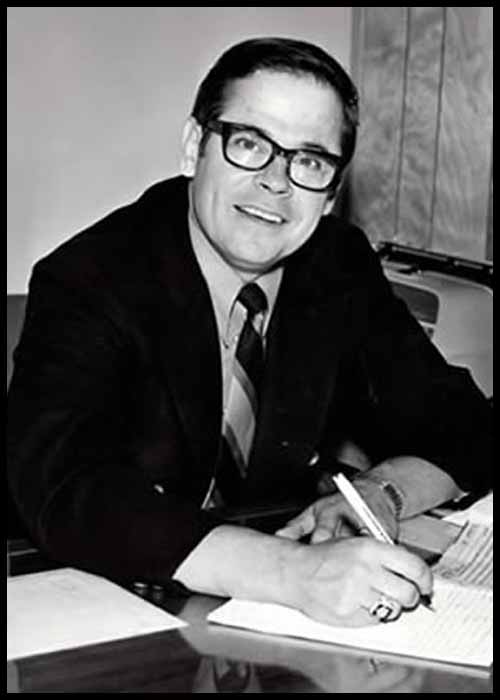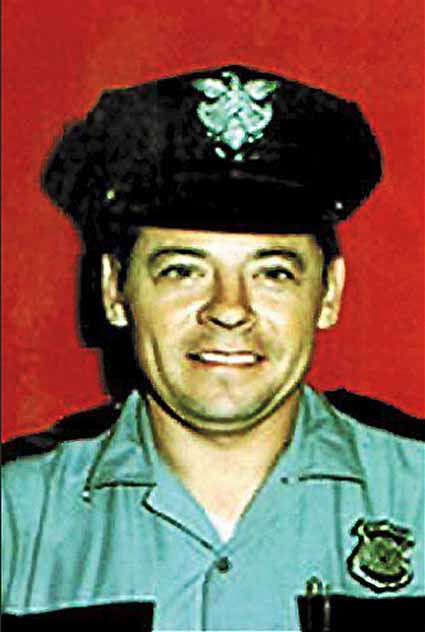Det. Sgt. William Prochazka

Remembering Detective Sergeant William Prochazka
A Life Well Led
William Prochazka and his twin brother were the youngest of nine children. William’s parents had immigrated to the United States in hopes of a better life. They were poor but proud and life was difficult. They kept their faith and worked hard and all nine of the of the Prochazka children grew to adult hood, earned an education, and were aware of their good fortune in having been born in America. William and his brother learned from their parents how important it was to help others. Both William and his brother decided the become police officers.

Detective Sergeant William Prochazka always believed in helping those in need. Prior to becoming a police officer he worked at a gasoline station. When the station owner suffered a heart attack Det. Sgt. Prochazka worked at the station without pay to help his boss. When someone stole the tools from the service station Det. Sgt. Prochazka gave the service station owner a set he had just bought. He could often be found helping his neighbors, often assisting them in getting their cars started or unstuck after a heavy snow.
Det. Sgt. Prochazka’s desire to help others carried forward to his police work. He was well respected by both the community and by his fellow officers. He also had an amazing ability to help troubled youths. He was so successful at it that in 1971 he was named head of the newly created juvenile bureau.
On Sunday November 9, 1975 Det. Sgt. Prochazka was looking forward to spending the Thanksgiving holiday with his wife and four children, Brian, age 6, Bobby, age 9, Bill Jr., age 14, and daughter Laurel age 17. That evening, while playing a board game with his wife and two of his sons, Det. Sgt. Prochazka talked about taking a vacation day the following day to do some work around the house. Mrs. Prochazka knew he would not because of how committed he was to his work. She never could have imagined that decision would cost Det. Sgt. Prochazka his life.
A Cold Blooded Execution
On Monday November 10, 1975, at around 1:30 PM Det. Sgt. Prochazka and his partner, Detective James Toth, were cruising near the Southgate Shopping Center. Officer Prochazka advised his partner he needed to drop by Blonder’s Paint Store to show employees mug shots that he had just received from The FBI. About five weeks earlier several men tried to rob the store and Officer Prochazka hoped employees could make photo identification. Officer Toth said he would stop in the dry cleaning store next door while Officer Prochazka was in the paint store.
When Detective Prochazka entered the store he saw no one in the main area that was separated from the back room by a leather door. He had no idea that a few minutes earlier three men had stormed the paint store and ordered the six customers and five employees into a rear washroom. The men were all armed, two with guns and the third with a sawed off shotgun. One robber had already cleaned out the cash register and another was trying to break open a cash box in the back room of the store when Det. Prochazka walked in. Officer Prochazka looked around and proceeded to look for someone in the back room. When Det. Sgt. opened the leather door the three thugs confronted him. A single shot rang out and Det. Sgt. Prochazka fell to the floor. The three men ran out the back door to a waiting getaway car. One of the stores employees wrote down the license plate number on the side of a paint carton and called police.
When police arrive the found Det. Sgt. Prochazka on the floor of the back room. He was dead. Police ran the license plate number and trace the car back to the grandmother of Dwain Farrow. At around 2:45PM Cleveland Patrolman Robert Kinzett and Gary Payne spotted a vehicle fitting the description given by witnesses. The pulled the car over and found Dwain Farrow and Duran Harris inside. They each had a revolver and one of them had been fired once. They did not find the shotgun. Police arrested Harris and Farrow and it did not take long for Farrow to implicate George Clayton and Michael Manns. A manhunt began to find both cop killers.
While authorities were searching for the suspects Det. Sergeant Prochazka was laid to rest at All Saints Cemetery. Mayor Lucille Reed said, “He was always with kids. He counseled kids in trouble confidentially and they respected him.” Police Chief Meuti praised the officer as a good policeman. The priest at the funeral said the Det. Sgt. Prochazka was “not only an enforcer but a man who reached out to others.” Nods came from the former troubled youth who came to pay their last respects to the man who changed their lives. As the casket was wheeled to a hearse in the wind driven snow there was complete silence. All that could be heard was a rope hitting a metal flagpole at the church’s entrance.

William Prochazka’s name is inscribed on the National Law Enforcement Officers Memorial Wall, Washington, D.C. panel 15, west wall, line 1.
Four Cop Killers Sentenced To Death Become Parole Eligible
George Clayton turned himself in to authorities ten days after Officer Prochazka’s murder. He was also indicted for a robbery that occurred a few weeks earlier at the Commonwealth Lumber Company. Duran Harris was also charged in that robbery.
While police continued to search for Manns juries tried all three other men. Thanks to the witness in the store and Farrow’s statements all men were easily found guilty.
Duran Harris, the getaway driver was convicted first.
Next was Dwain Farrow. Police offered Farrow a plea deal, which would have spared him the death penalty. Farrow refused the offer. He also claimed he did not have a gun, which witness at the paint store said was a lie. They told jurors that Farrow was the one who herded them into the bathroom at gunpoint.
Clayton was also convicted of the robbery and killing Det. Sgt. Prochazka. Clayton told police he was in the paint store and knew Det. Sgt. Prochazka was a policeman. He blamed the shooting on Michael Manns who was still on the run and not there to defend himself. According to Clayton, Manns said he shot Det. Sgt. Prochazka because he knew Sgt. Det. Prochazka could identify him. Clayton said he heard a gunshot and turned to see Manns standing over Det. Sgt. Prochazka with a smoking gun. Asst. Prosecutor Charles Laurie was not convinced. In closing arguments he stated, “I’m not so sure that it wasn’t Clayton himself that did the shooting. Both he and Manns were armed, both right beside Prochazka when he was shot. We only have Clayton’s word that it was Manns.”
Manns remained on the run for ten months until authorities found him in Detroit Michigan. Mann took the stand at his trial and denied planning the robbery and his role as the triggerman. Based on the overwhelming evidence the jury saw right through him and found him guilty of the robbery and the murder of Det. Sgt. William Prochazka.
Michael Manns, Dwain Farrow, George Clayton and Duran Harris received the death penalty for their hideous crimes. However, due to the uncertainty of constitutional rights of the death penalty, all four of their sentences were overturned and they were given life in prison. Manns, Farrow and Clayton remain in prison. Harris was released from prison in 2003. The family of William Prochazka was not informed of this parole hearing and thus was unable to oppose Harris’ parole. Manns, Clayton, and Farrow are now regularly up for parole.